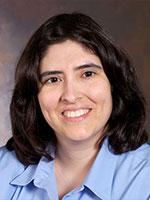- Education
- PhD, Arizona State University, 2003.
Major: Computer Science
Dissertation Title: Requirements engineering process simulation in undergraduate software engineering courses - MS, California Polytechnic State University, San Luis Obispo, 1996.
Major: Computer Science - BS, California Polytechnic State University, San Luis Obispo, 1994.
Major: Computer Science
- PhD, Arizona State University, 2003.
- Research
Broadly my research interests involve accessibility (HCI), Software Engineering, and Computer Science Education. Most of my work targets pre-college students, but some projects focus on students at the university level.
ACCESSMATH / ACCESSLECTURE
Science and math education is critical to open science, math, engineering and technology careers to students. The goal of the AccessLecture project is to develop prototype that provides visually impaired students in grades 6-12 with greater access to science and math presentations by instructors in the classroom. In addition, students at the university level will also benefit from such a system. A systematic research program will develop a portable system, attaching to a whiteboard that communicates with a computer, requiring low instructor overhead, and enabling students with low vision (mild to moderate) to participate in math and science lectures, thus improving math and science achievement. Students will use the iPad tablet to enlarge the material as needed, adjust contrast, navigate through lecture material and refer back to lecture material and their notes, further reinforcing material comprehension and promoting greater achievement. The real-time presentation of the material will enable students to ask questions at the time the materials is being presented and to participate in class activities that use the whiteboard (e.g. class work problems). Initial testing has demonstrated that sighted students are also interested and see benefit from such as system. AccessMath is supported by the National Science Foundation
ACCESSIBLE BLOCK-BASED PROGRAMMING TOOLS
Many efforts to get kids interested in Computer Science involve block-based programming (e.g. Scratch), but students who are visually impaired cannot participate since the tools are not accessible. An accessible version of Blockly and Pencil Code are underway to support users who are visually impaired without impacting use by sighted users. Some of this work is supported by the National Science Foundation.
INCLUSIVE EXPLORING COMPUTER SCIENCE
The University of North Texas, in collaboration with TERC, proposes the Inclusive Exploring Computer Science (I-ECS) curriculum as a set of curricular and tool-based enhancements for visually impaired high school students. I-ECS will be conducted via face-to-face and online support for cohorts of visually impaired high school students. While innovations have resulted in assistive technology for people with disabilities, gaps remain in the level of participation in university-level computing degree programs by the visually impaired. A significant factor is the lack of precollege preparation in courses that promote success in computing degrees. Isolation, the lack of role models and access to resources contribute as well.
The project strives to increase the participation of students with visual impairments through better preparation and support. The overall goals are to increase access to an established curriculum (Exploring Computer Science) and success within the area of computing for students with visual impairments at the high school level. The development of programming tools and online modules will provide access where gaps exist in current software. The project team will assess the degree to which original Exploring Computer Science (ECS) can be made accessible to high school students who are visually impaired. The comparison in student achievement and attitudes about Computer Science will also be conducted between students using the ECS curriculum and those using the I-ECS curriculum in order to evaluate the similarity of the two curricula. By design, the I-ECS project intends to increase participation in computing by individuals with visual impairments at all socioeconomic levels via student and educator support. The project will involve students, parents and educators from around the nation.
The structured approach, building on the foundation of an existing high school computer science curriculum, will enable those with visual impairments to have greater access to the diverse areas of computer science through face-to-face and online resources that foster continuous learning and community, as the means to transition to college degrees in computing. The project components are designed to promote growth by all participants, including parents. The online community will foster greater accommodation of visually impaired students in the computer science classroom. Assessment will provide much needed statistical analysis of both the challenges and successes of students who are visually impaired.
I-ECS is funded by the National Science Foundation, Award # CNS-1240809
JBRICK: ACCESSIBLE LEGO MINDSTORMS PROGRAMMING TOOLS
JBrick is a cross-platform programming tool to enable both sighted and visually impaired usrs to program LEGO Mindstorms robots using the NXC (Not eXactly C) language. The software is compatible with both screen readers and refreshable braille displays. JBrick is supported by the National Science Foundation.
KINESTHETIC LEARNING AND SOFTWARE ENGINEERING VIA LEGO
This project, a collaboration between the University of North Texas and Central Connecticut State University, explores the role that kinesthetic learning can play in the undergraduate Software Engineering classroom using LEGO. Materials from the project, a set of learning activities and supporting materials, will be shared with educators. This project is at the early stages. Support for this project is by the National Science Foundation.
 Main Menu Toggle
Main Menu Toggle
